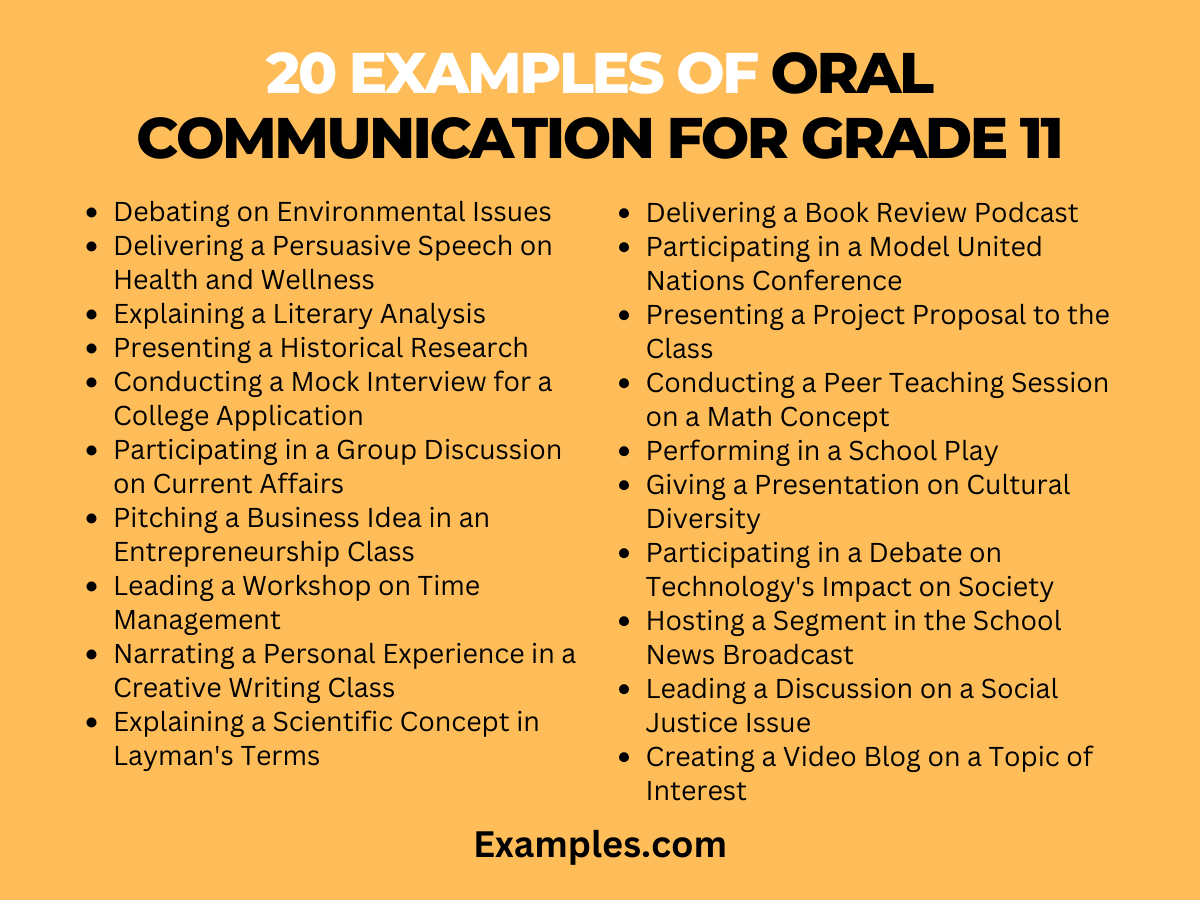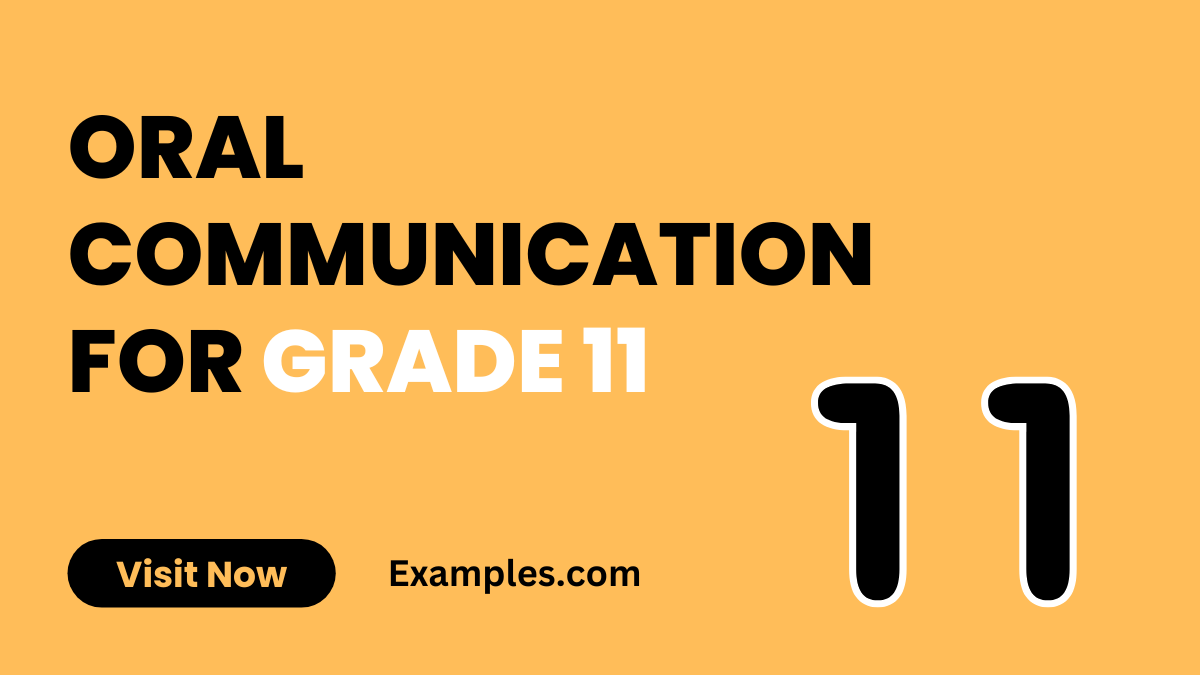19+ Oral Communication for Grade 11 Examples
Dive into the world of Oral Communication for Grade 11 with our comprehensive guide, designed to elevate your speaking prowess. This guide, enriched with engaging oral Communication Examples, provides an in-depth exploration of effective communication strategies tailored for high school students. Whether it’s for class discussions, public speaking, or everyday interactions, our guide offers practical sentence examples and key tips to enhance your assertive communication skills. Ideal for students and educators, this resource is a gateway to mastering the art of eloquent and confident communication, crucial for academic success and beyond.
20 Examples of Oral Communication for Grade 11
Oral communication skills are pivotal for Grade 11 students, preparing them for future academic and professional endeavors. This guide presents 20 diverse and practical examples of oral communication tailored for eleventh graders. These scenarios cover various situations, from classroom discussions to public speaking, and emphasize the importance of clear expression, active listening, and respectful dialogue. Each example is designed to enhance students’ confidence and effectiveness in verbal communication, an essential skill in today’s collaborative and interactive world.

- Debating on Environmental Issues: Present your stance with well-researched facts and a balanced perspective. This develops argumentative skills and critical thinking.
- Delivering a Persuasive Speech on Health and Wellness: Use emotional appeal and logical arguments to persuade your audience. This hones persuasive speaking and audience engagement skills.
- Explaining a Literary Analysis: Discuss themes and characters, using evidence from the text. This showcases analytical skills and depth of understanding.
- Presenting a Historical Research: Narrate historical events with clarity and insight, linking them to current contexts. This enhances informative speaking and historical knowledge.
- Conducting a Mock Interview for a College Application: Simulate an interview scenario, demonstrating how to respond to questions confidently. This prepares students for real-life interviews.
- Participating in a Group Discussion on Current Affairs: Share opinions while respecting diverse viewpoints. This fosters collaborative discussion and open-mindedness.
- Pitching a Business Idea in an Entrepreneurship Class: Present your business concept clearly and convincingly. This develops presentation and entrepreneurial skills.
- Leading a Workshop on Time Management: Teach peers time management techniques with clear, concise instructions. This enhances leadership and instructional abilities.
- Narrating a Personal Experience in a Creative Writing Class: Share a story with vivid descriptions and emotional depth. This improves storytelling and expressive skills.
- Explaining a Scientific Concept in Layman’s Terms: Break down complex scientific ideas into understandable language. This demonstrates skill in making complex topics accessible.
- Delivering a Book Review Podcast: Critically analyze and discuss a book in an engaging manner. This blends critical thinking with expressive, digital communication.
- Participating in a Model United Nations Conference: Represent a country and articulate its position on global issues. This builds diplomatic and public speaking skills.
- Presenting a Project Proposal to the Class: Clearly outline the project’s objectives, methodology, and expected outcomes. This is key in persuasive and informative communication.
- Conducting a Peer Teaching Session on a Math Concept: Explain a mathematical theory or problem-solving method. This cultivates the ability to teach complex concepts clearly.
- Performing in a School Play: Express your character’s emotions and motivations convincingly. This develops expressive and emotional communication skills.
- Giving a Presentation on Cultural Diversity: Discuss different cultures with respect and understanding. This promotes cultural awareness and sensitivity in communication.
- Participating in a Debate on Technology’s Impact on Society: Argue for or against the motion with logical reasoning and evidence. This sharpens debate and critical thinking skills.
- Hosting a Segment in the School News Broadcast: Deliver news in a clear, engaging manner. This enhances public speaking and broadcast communication skills.
- Leading a Discussion on a Social Justice Issue: Facilitate a conversation, ensuring all voices are heard. This demonstrates leadership and empathetic listening skills.
- Creating a Video Blog on a Topic of Interest: Communicate your passion and knowledge through a digital medium. This combines content creation with effective oral communication.
11th Grade Oral Communication Activities
Engage in the dynamic and interactive 11th Grade Oral Communication Activities, designed to enhance your speaking and listening skills. This section offers a diverse range of activities, each promoting active engagement and practical application of communication techniques. Tailored for Grade 11 students, these activities focus on developing assertiveness, clarity, and empathy in various speaking scenarios, making them ideal for honing both verbal and nonverbal communication skills in real-world contexts.

- Participating in a Podcast Discussion: Discuss a chosen topic, showcasing your ability to articulate thoughts clearly and engage in active listening.
- Simulating a Press Conference: Role-play as a public figure answering media questions, practicing quick thinking and clear communication.
- Hosting a Radio Show Segment: Create and host a segment on a topic of interest, developing broadcasting and persuasive speaking skills.
- Leading a Peer Meditation Session: Guide peers through meditation, using calm and soothing communication to foster relaxation and mindfulness.
- Organizing a Storytelling Circle: Share personal or fictional stories, focusing on expressive speaking and engaging storytelling techniques.
- Facilitating a Workshop on Digital Literacy: Teach peers about digital safety and responsibility, using clear and informative communication.
- Conducting a Science Experiment Presentation: Explain a scientific experiment, focusing on clarity and accuracy in conveying complex information.
- Engaging in a Cultural Exchange Dialogue: Discuss cultural experiences and perspectives, fostering cross-cultural understanding and respect.
- Presenting a TED-Style Talk on a Passion Project: Deliver a short, impactful talk on a subject you’re passionate about, emphasizing persuasive and inspirational speaking.
- Creating an Educational Vlog Series: Develop a series of educational videos on a topic of choice, combining content creation with effective oral communication skills.
Oral Communication Module for Grade 11
The Oral Communication Module for Grade 11 is a comprehensive resource designed to enhance students’ communicative competence. It encompasses a wide array of modules, each focused on specific aspects of oral communication such as assertiveness, clarity, and empathy. This resource is an invaluable tool for students aiming to master the nuances of effective communication, with practical examples and interactive elements tailored to the unique challenges and opportunities of Grade 11.

- Analyzing Famous Speeches: Study and discuss famous speeches, understanding the techniques used for effective public speaking.
- Participating in a Virtual Book Club: Discuss and analyze books in a virtual setting, practicing clear expression and active listening.
- Creating an Informative Documentary: Develop a short documentary on a topic of social relevance, focusing on narrative skills and informative communication.
- Engaging in a Bilingual Conversation Practice: Practice speaking in a second language, enhancing language skills and cultural appreciation.
- Organizing a Public Speaking Contest: Participate in or organize a speaking contest, focusing on developing and showcasing persuasive speaking abilities.
- Leading a Debate on Ethical Dilemmas: Engage in debates on complex ethical issues, promoting critical thinking and articulate expression.
- Delivering a Presentation on Sustainable Living: Present on environmental sustainability, using persuasive techniques to encourage awareness and action.
- Hosting a Panel Discussion on Teen Issues: Moderate a discussion on relevant teen issues, practicing facilitation and empathetic communication.
- Creating a Motivational Speech for Peers: Write and deliver a speech intended to motivate and inspire classmates, focusing on emotional appeal and persuasive techniques.
- Participating in a Poetry Slam Event: Perform original poetry, focusing on expressive delivery and emotional resonance.
What are the Oral Communication Grade 11 Types of Speech According to Delivery?
In Grade 11 oral communication, various types of speech according to delivery are pivotal for effective communication. These types include:
- Impromptu Speech: This type of speech involves speaking without prior preparation, often in response to a spontaneous situation or question. It tests the speaker’s quick thinking and ability to articulate thoughts coherently on the spot.
- Extemporaneous Speech: This speech is delivered with some preparation but without a full script, balancing preparation with spontaneity. It requires an understanding of the topic and the ability to speak naturally and persuasively.
- Manuscript Speech: Here, the speech is read from a written text. It’s used in formal settings where accuracy of the content is crucial. This type demands a clear reading style and the ability to maintain audience engagement despite reading from a script.
- Memorized Speech: This involves delivering a speech that has been memorized word for word. It allows for precise delivery but requires significant preparation and the ability to recite effectively without losing the natural tone of speaking.
Each type presents unique challenges and opportunities in oral communication, requiring different skills that are crucial for Grade 11 students to master.
What are the Elements of Oral Communication Grade 11?
Oral communication in Grade 11 encompasses several key elements that contribute to the effectiveness of speech. These elements include:
- Content: The substance of the speech, including the main ideas, arguments, and information presented. Content should be relevant, well-researched, and tailored to the audience.
- Clarity: Clear expression of ideas is fundamental. This involves the use of appropriate language, a logical flow of thoughts, and the avoidance of ambiguity.
- Voice Modulation: Varying the pitch, tone, and volume of the voice to maintain audience interest and emphasize key points.
- Body Language: Nonverbal cues like gestures, facial expressions, and posture, which complement the spoken words and enhance the message.
- Engagement: The ability to connect with the audience, maintain their interest, and encourage interaction.
- Listening: Active listening skills are vital, especially in interactive scenarios like debates or discussions.
- Feedback Interpretation: Understanding and responding to the audience’s verbal and nonverbal feedback.
- Adaptability: The ability to adjust the speech based on the audience’s response or changing circumstances.
In conclusion, the article “Oral Communication for Grade 11” on Examples.com provides a comprehensive guide for eleventh-grade students to enhance their oral communication skills. Covering a wide array of scenarios, from debating environmental issues to delivering persuasive speeches and explaining literary analyses, this guide equips students with the necessary skills to effectively articulate their ideas and thoughts. The emphasis on clarity, critical thinking, and the ability to engage an audience is particularly beneficial for students at this stage of their education, preparing them for higher academic challenges and real-world interactions.
For students and educators seeking further resources to enhance their oral communication skills, Stanford University’s “The College Puzzle” blog offers valuable insights. The blog emphasizes the importance of oral communication skills for students, providing tips and strategies to improve these skills in an academic setting. This resource can be accessed at Stanford University – The College Puzzle.
Additionally, the Agency for Healthcare Research and Quality provides a comprehensive guide on spoken communication. This guide focuses on improving oral communication skills in healthcare settings, but the principles and techniques discussed are broadly applicable to all areas of communication. This resource is especially useful for students interested in healthcare professions or looking to enhance their communication skills in a professional context. It can be accessed at AHRQ – Spoken Communication.



